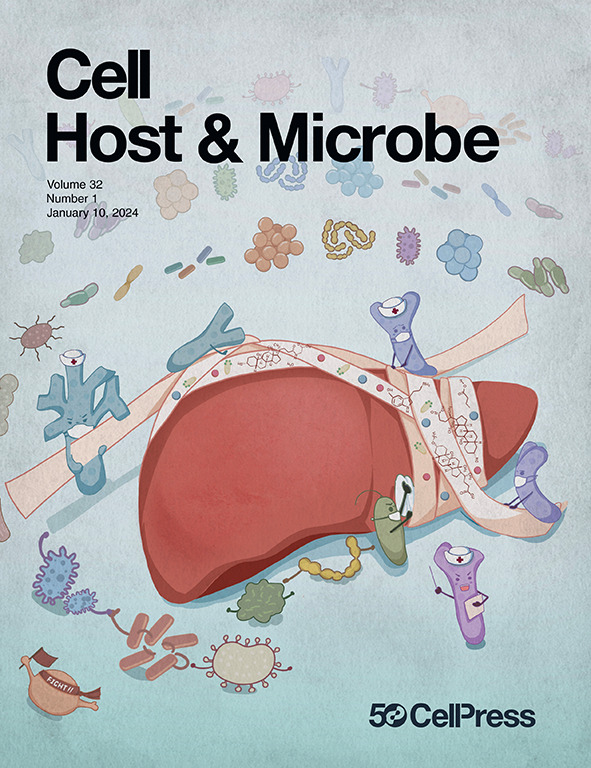抗生素引起的肠道微生物群紊乱改变了对狂犬病疫苗的免疫反应
IF 20.6
1区 医学
Q1 MICROBIOLOGY
引用次数: 0
摘要
肠道微生物群在调节人体免疫力方面起着至关重要的作用。以前,我们报道过抗生素诱导的微生物组扰动会影响流感疫苗反应,这取决于预先存在的免疫水平。在这里,我们采用系统生物学方法来分析抗生素给药对人类狂犬病疫苗的一次和二次免疫反应的影响。抗生素减少了肠道细菌负荷,并长期减少了共生多样性。这种改变与狂犬病特异性体液反应的减少有关。多组学分析显示,抗生素给药诱导(1)在接种疫苗后早期增强的促炎特征,(2)疫苗特异性t -辅助性t - 1 (Th1)向t -滤泡辅助性t - Th1表型反应的平衡发生变化,以及(3)代谢物,特别是血液中次级胆汁酸的深刻改变。通过整合多组学数据集,我们建立了一个多尺度、多反应的网络,揭示了关键的调控节点,包括微生物群、次生胆汁酸和对疫苗的体液免疫。本文章由计算机程序翻译,如有差异,请以英文原文为准。

Antibiotic-induced gut microbiome perturbation alters the immune responses to the rabies vaccine
The gut microbiome plays a crucial role in modulating human immunity. Previously, we reported that antibiotic-induced microbiome perturbation affects influenza vaccine responses, depending on pre-existing immunity levels. Here, we employed a systems biology approach to analyze the impact of antibiotic administration on both primary and secondary immune responses to the rabies vaccine in humans. Antibiotic administration reduced the gut bacterial load, with a long-lasting reduction in commensal diversity. This alteration was associated with reduced rabies-specific humoral responses. Multi-omics profiling revealed that antibiotic administration induced (1) an enhanced pro-inflammatory signature early after vaccination, (2) a shift in the balance of vaccine-specific T-helper 1 (Th1) to T-follicular-helper response toward Th1 phenotype, and (3) profound alterations in metabolites, particularly in secondary bile acids in the blood. By integrating multi-omics datasets, we generated a multiscale, multi-response network that revealed key regulatory nodes, including the microbiota, secondary bile acids, and humoral immunity to vaccination.
求助全文
通过发布文献求助,成功后即可免费获取论文全文。
去求助
来源期刊

Cell host & microbe
生物-微生物学
CiteScore
45.10
自引率
1.70%
发文量
201
审稿时长
4-8 weeks
期刊介绍:
Cell Host & Microbe is a scientific journal that was launched in March 2007. The journal aims to provide a platform for scientists to exchange ideas and concepts related to the study of microbes and their interaction with host organisms at a molecular, cellular, and immune level. It publishes novel findings on a wide range of microorganisms including bacteria, fungi, parasites, and viruses. The journal focuses on the interface between the microbe and its host, whether the host is a vertebrate, invertebrate, or plant, and whether the microbe is pathogenic, non-pathogenic, or commensal. The integrated study of microbes and their interactions with each other, their host, and the cellular environment they inhabit is a unifying theme of the journal. The published work in Cell Host & Microbe is expected to be of exceptional significance within its field and also of interest to researchers in other areas. In addition to primary research articles, the journal features expert analysis, commentary, and reviews on current topics of interest in the field.
 求助内容:
求助内容: 应助结果提醒方式:
应助结果提醒方式:


